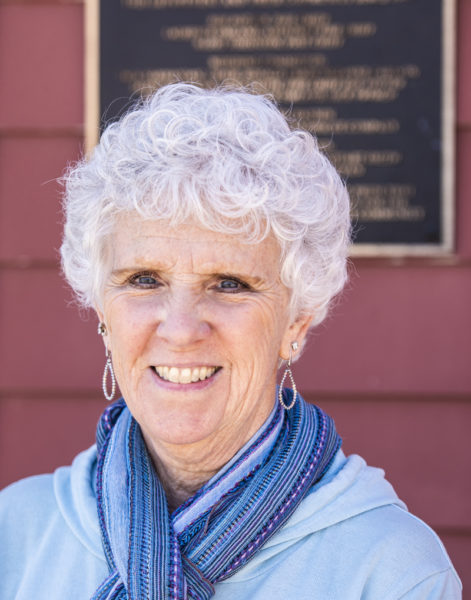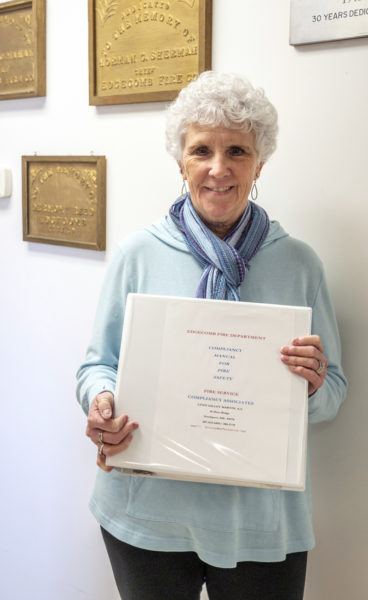
Lynn Martin stands outside the Edgecomb Fire Department on Monday, April 10. The Edgecomb department is one of more than 100 fire departments in Maine that Martin has consulted with on state mandated safety requirements. (Bisi Cameron Yee photo)
Lynn Gilley Martin is passionate about the process of transition. Whether from chaos to clarity, problem to solution, illness to health, or life to death, Martin is dedicated to helping people and organizations move from one stage to the next.
Martin was born in Augusta, but relocated to Boothbay at the age of 5 when her father died and her mother remarried. She grew up near Ocean Point and graduated from Boothbay Region High School in 1977.
Martin attended Andover College in Portland and secured a job as a medical assistant at St. Andrews Hospital in Boothbay Harbor. Eventually she moved into administration and billing at the hospital before taking on similar roles for private physicians.
The roots of Martin’s current calling as a consultant for fire departments across Maine were formed when she was chair of the Southport Select Board. Facing a state inspection she discovered local fire departments were finding it difficult to meet compliance requirements.
Martin researched the topic, took classes, met with experts, and designed a comprehensive manual that addressed all the state’s expectations. She presented the manual to the Lincoln County Fire Chiefs Association and almost immediately had seven orders.
Martin was running a physician’s practice at the time, but the work she was doing with the fire departments took on a life of its own. She founded Fire Service Compliancy Associates in 2006 and since then she has traveled throughout the state, compiling individualized manuals for more than 100 fire departments.
Soon other municipal entities asked for her help with issues like hazardous materials and bloodborne pathogens. She has consulted with police departments, transfer stations, and public works departments, but her primary passion remained fire departments.
Each department is different, according to Martin. She works closely with some, updating manuals, documenting required training, making sure that ladders are inspected, and hoses are tested. She said one chief even calls her Nagatha in jest.
With others, “I’m like this phantom,” she said. “I just show up (and when) they come in things are done.”
Edgecomb Fire Department Chief Roy Potter said Martin was the first person he hired when he moved into the chief’s position.
“You don’t realize how fast a year goes by with everything that’s thrown at you,” he said. “There are things that get overlooked. (She) catches that stuff.”
When Potter bought a snowblower for the station, he didn’t think twice about the purchase until Martin pointed out that it was a hazardous piece of equipment.
“Everyone in Maine knows how to run a snowblower and not stick your hand in,” he said “But (the firefighters) still needed to be trained.”
Potter said Martin was instrumental in convincing the town of the need for a new station house. According to Potter, the old station was so small and poorly configured firefighters had trouble accessing some of the apparatus. It had no running water, no bathroom, and no space for training.
Martin attended an Edgecomb town meeting to advocate for the department.
“She’s a different face,” Potter said. “Somebody from the outside who knows the standards … We did our homework and when it came time to vote for a new station … not a question was asked.”
There are two kinds of inspections Maine fire departments can expect to receive from the state.
Enforcement inspections may happen at any time and can result in fines of $700 to $2,000 for each life safety issue. Multiple fines can add up

Lynn Martin poses with the manual she created for the Edgecomb Fire Department on Monday, April 10. Consulting with fire departments on safety issues has become a passion for Martin, whose previous career was primarily in the medical field. (Bisi Cameron Yee photo)
quickly resulting in a cost of $15,000 to $20,000 for cash-strapped municipalities.
Consultations are courtesy inspections meant to aid departments in meeting the stringent safety standards set by the state. When a department passes inspection during a consultation they can become eligible for the Safety and Health Award for Public Employers, or the SHAPE award, a designation that recognizes the department’s commitment to safety and also exempts them from safety inspections for a period of two years.
Many of the departments Martin has worked with have earned the prestigious award.
Martin takes her job very seriously and she expects her clients to do the same. She’s worked with departments that didn’t follow through and when that happens she cuts them loose.
There are also times she chooses to work without compensation. She gifted a manual to a small rural department with an annual budget of only $25,000 because “they were that invested,” she said.
Throughout her career Martin continued to seek out opportunities to learn about topics both scientific and spiritual. She studied to become an operating room technician, took classes in massage, and learned the healing art of reiki.
When she became interested in the process of death and dying she became a certified death doula, a skill that stood her in good stead during six years with the tribute center at Hall’s Funeral Home, in what she refers to as her “Earth Angel” job.
Martin said there were times during her tenure at Hall’s when she was honored to attend body removals, those emotionally fraught times when a person who has died is taken from their family and transported to the funeral home.
“It’s the compassionate part that I love,” she said of the removal process.
As a death doula, Martin sees the family through from start to end, helping them with the details like obtaining the death certificate, contacting family and friends, writing the obituary, or ordering flowers. Martin is an intricate part of the family’s life for a week and then it’s over. She admitted the sudden stop when the job is done and the family no longer needs her assistance is sometimes difficult for her.
Martin said her goal is to demystify the process of death and dying and help people face life after loss. She has shepherded a number of people through the process of dying, including her mother and stepfather.
She wants people to know “this isn’t going to be awful,” she said. “Some people need time to walk the last part of their journey on this earth the way they want to.”
Martin believes people should have agency over how they die. She asks her clients how they want their death to proceed, who they want present, how they want to be remembered, and whether they want a service at sunrise or sunset.
One client requested non-stop Elvis music. Another wanted to be surrounded by memories of Christmas because it was their favorite holiday. Martin sees herself as their best advocate, someone who can ease their fear and help them face what’s coming on their own terms.
Martin is also president of the Boothbay Region Alumni Association, a position she’s held for the last 18 years. Her favorite role with the association is planning the grand march, a 100-year-old tradition during which graduating seniors don white gowns and white tuxes to enter the graduation venue.
Martin remembers her own grand march “like it was yesterday.” She loves the celebratory tradition so much that she was instrumental in its 100th anniversary when multiple generations of Boothbay Region graduates reenacted the ceremony that, for Martin, signifies the transition to adulthood.
While Martin has been a part of any number of transitions over the course of her life from births to graduations to marriages, from crisis to calm, she said she finds herself most drawn to the experience of death.
“We are born from darkness into light,” Martin said. But it’s the transition from light back into darkness where she most feels her purpose.
“Really, it’s just to the other side,” she said. “We’re just crossing over.”
(Do you have a suggestion for a “Characters of the County” subject? Email info@lcnme.com with the subject line “Characters of the County.”)

An exhaustive manual of safety information, checklists, and training documentation sits on a desk at the Edgecomb Fire Department on Monday, April 10. The binder was compiled specifically for the Edgcomb department by consultant Lynn Martin. (Bisi Cameron Yee photo)






